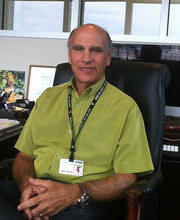Dennis Lee Kasper

My laboratory has long been interested in the interactions of microbes, both commensals and pathogens, with the immune system. Our overall major research focus has been on bacterial carbohydrates. In studies innovatively integrating structural carbohydrate chemistry, microbiology, immunology, biochemistry, and genetics, we have studied the carbohydrates of group B Streptococcus, the foremost cause of serious neonatal bacterial infections, and Bacteroides fragilis, an important intestinal commensal.
In recent years, our research has expanded to encompass the interactions of the microbiota with the mucosal and systemic immune systems. We elucidated the structure of all nine capsular polysaccharides and important surface proteins of group B Streptococcus as well as their role in pathogenesis, deriving a highly immunogenic glycoconjugate vaccine that is now entering Phase 3 clinical trials. Studying B. fragilis, we discovered capsular polysaccharides on the organism's surface that are essential for stimulating the immune system. Remarkably, we found that single strains produce eight phase-varying polysaccharides, at least two of which have a zwitterionic charge motif. Overturning immunologic paradigms, we discovered how one zwitterionic polysaccharide, PSA, is processed via the endosomal MIIC pathway in antigen-presenting cells, depolymerized by NO-dependent deamination, and presented to CD4+ T cells by MHCII. We then found an essential role for PSA in shaping mammalian immune development by stimulating normal splenic CD4+ T-cell numbers, establishing and maintaining TH1/TH2 balance, and thereby directing splenic organogenesis. PSA has potent immunomodulatory and anti-inflammatory activity, stimulating CD4+ T-cell production of IL-10, which protects animals against experimental models of inflammatory bowel disease and multiple sclerosis.
Our work on commensals has led to identification of other aspects of the microbiome‘s interactions with the immune system, including the relationship of the microbiome to iNKT cells and mammalian susceptibility to experimental colitis and asthma. We have shown that species-specific microbes are required for proper maturation and development of the mucosal immune system. Our investigations have opened new fields of research on the role of carbohydrates in shaping immune development and balance and the role of the microbiome in susceptibility to immune-mediated diseases.
Another area of our work deals with Francisella tularensis, which is considered a potential agent of bioterrorism. We have taken a reverse-vaccinology approach to developing a vaccine against this important pathogen. We have cloned and expressed the entire proteome of the organism and have begun to screen the expressed proteins for their ability to induce cellular immunity. Through this ongoing immunologic screening, we will identify proteins that elicit protective immune responses, as assessed by cytokine production, and we will select vaccine candidates for further studies.
Contact Information
NRB Building, Room 1056C
77 Ave. Louis Pasteur
Boston, MA 02115
